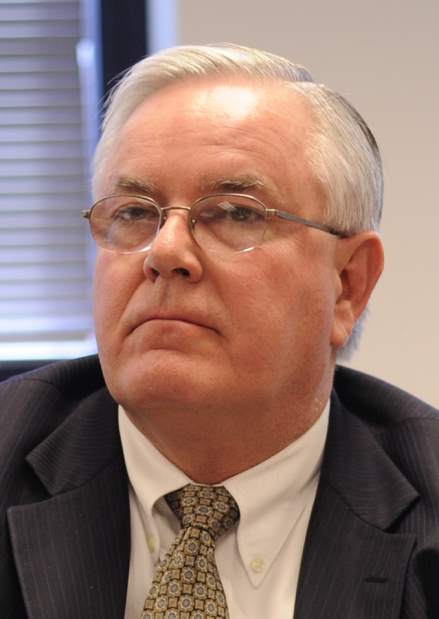Casino dealers, workers get OK to play in Pennsylvania
The mood at the Meadows poker table seemed like a party.
Three players provided entertainment for everyone as they joked with each other, talked about work and groused about a former boss. A fourth player, a more silent type, shared their background.
What set this quartet apart from other work buddies enjoying a night out was the job they hold: All are dealers at Rivers casino and were taking advantage of a just-announced change in state regulations that allows them to gamble in Pennsylvania as long as they don't play in the casino where they work.
Previously, dealers and other casino employees requiring a Pennsylvania gaming license had to go out-of-state when they wanted to play poker, blackjack or slots.
Regulators took a cautious approach when slot machines were legalized six years ago, said Kevin O'Toole, executive director of the Gaming Control Board.
The ban on in-state gambling applied to any employee requiring a license, permit or registration with the board. That covered not only dealers but anyone with access to the casino floor, including valets, food and beverage workers and maintenance staff. An exact count of the workers affected was not available, but O'Toole said it involved a “significant percentage” of the workforce. Pennsylvania casino employment totaled 13,050 at the end of 2011, according to an American Gaming Association survey.
The idea behind the original rule was to remove any suspicion that employees of the newly opened casinos might somehow have an inside edge. With more than five years of slot operations and almost two years of table game play under their belt, regulators took a new look at the rule.
“We concluded that there isn't a significant risk of collusion when a person, who happens to be employed by a casino, is allowed to gamble, so long as they're gambling somewhere other than where they work,” O'Toole said.
Individual casinos can impose their own restrictions on employee gambling. For example, a chain might bar employees from playing in any affiliated casino rather than just the home casino.
The lifting of the Pennsylvania ban might have an initial impact on the number of players at the poker room at Mountaineer Casino in Chester, W.Va., said Christine Stacy, manager of the poker room there and at Presque Isle in Erie. Both are owned by MTR Gaming.
Mountaineer added table games in December 2007, and Stacy said it felt the effects of casinos starting in Pennsylvania and now Ohio. The Horseshoe casino in Cleveland opened May 14, and Hollywood opened May 29 in Toledo.
“In spite of the changes we have endured at Mountaineer, we continue to be busy,” she added, noting the room had eight full tables on Wednesday night. “We will be just fine.”
The rules change brings Pennsylvania in line with jurisdictions like Nevada.
Nevada has no law restricting where casino employees may play, although company policies might limit them, said Jeff Jaeger, president of Las Vegas Dealers Local 721, which is affiliated with the Transport Workers Union and represents dealers at Wynn and Caesars Palace.
Some forbid employees from playing progressive slots in their home casino, said Jaeger, a dealer for 20 years.
Because poker players compete against each other rather than the house, some casinos allow dealers to play at their home casino — even during a break.
Still, Jaeger said most dealers who play decide to go elsewhere for their entertainment.
“It's definitely a bad idea to play where you work,” he said. An altercation over a ruling or an argument with a “regular” customer over could lead to disciplinary action or even getting fired.
Besides, not all casino employees get a kick out of gambling. After a full work day in a casino, many are ready to go home and leave the cards and slots to others, he said.
2 local players cash at WSOP
Josh Brikis of Monroeville and Daniel Sekora of Pittsburgh are the first Western Pennsylvania players to finish in the money in this year's World Series of Poker.
Both cashed in Event 9, a $1,500 No Limit Hold 'Em tournament, in which early losers could re-enter. It had 3,404 entrants, with 342 getting paid.
Brikis finished 97th, winning won $5,284; Sekora placed 331st, winning $2,895.
Money trail
Slot players lost $212.5 million last month in Pennsylvania's 11 casinos, the Gaming Control Board reported this week. That's a 3.37 percent increase from the $205.5 million in May 2011, before Valley Forge resort casino opened.
The state gets 55 percent of the gross slot revenue, or what's left of players' bets after all jackpots are paid.
Statewide, slot machines have paid off at a 90.04 percent rate since the fiscal year started in July. For every $100 wagered, the machines return an average of $90.04. Figures for Western Pennsylvania casinos:
89.84%
Rivers; May revenue of $23.18 million, down from $23.79 million last year.
89.74%
Meadows; May revenue of $21.9 million, up from $21.29 million last year.
90.41%
Presque Isle; May revenue of $12.95 million, up from $12.81 million last year.

